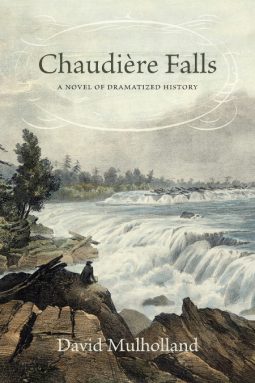
Ottawa’s a great place to live and work and to meet interesting, creative people. We’ll introduce you to some of them in The Ottawa Scene, a feature that will appear in our newsletter and on our blog or Facebook page once in awhile. We’d welcome your feedback, including who you’d like to see here, at blog@idealcarpetcleaning.ca.
Last month, we featured David Mulholland, an author who writes historical fiction. He began summarizing his new book, Chaudière Falls, about how our National Capital Region came into existence, including the establishment of Bytown/Ottawa, the village of Aylmer, and the founding of Hull Township by Philemon Wright. This month, he wraps up his summary.
Chaudière Falls: A Novel of Dramatized History
by David Mulholland
In last month’s newsletter, I summarized parts one through three, describing the challenges and setbacks faced by Philemon Wright and his associates while carving out a farming community amidst dense forest; the building of the Rideau Canal under the command of Lieutenant-Colonel John By; Jed Jansen’s personal afflictions and business setbacks; Bytown’s instability because the Upper Canada government refuses to recognize the village as a municipality; and the ethnic and religious violence that sees the settlement teetering on the brink of anarchy.
Part Four delves into the reunification of the Canadas, and relocation of the capital from Toronto to Kingston. Westminster’s condescending attitude towards colonials causes frustration and anger that erupts into political violence whose consequences bring Bytown into the running for the provincial capital.
While Upper Town’s Scottish elite attempt to gain legal status for the expanding village, and the passing of Philemon Wright places his company’s financial burden on the shoulders of his sons, Jed Jansen struggles to cope with the volatility of both the timber trade and his personal relationships.
In Part Five, the provincial government finally recognizes Bytown as a legal municipality. The capital moves from Kingston to Montréal, where one particular event is recognized, even today, as having altered Canada’s future. In Lower Town, another riot is still remembered as part of Bytown’s legacy. A coterie of Tories contrive to be annexed to the United States, and a chance encounter changes Jed Jansen’s life forever.
Part Six has Westminster scrambling to keep the province from again splitting in two. To appease Canadiens in Lower Canada, and English-speaking Canadians in Upper Canada, the seat-of-government is now alternating every four years between Toronto and Ville de Québec. This administrative nightmare has both sides wanting a permanent capital. But where? Following years of political stonewalling, the provincial government passes legislation that changes Bytown into the city of Ottawa.
Part Seven sees the question come to a head. Parliamentarians break into factions to argue that their city should be the permanent capital. The political manoeuvring would do Machiavelli proud. Months of shameless wrangling bring them no closer to a resolution, so Parliament petitions Queen Victoria, who selects Ottawa, which ignites more self-serving politics before the issue is finally resolved.
Jed Jansen is coping with another surprising turn in his unpredictable life. Now in his late sixties, he’s still trying to understand what’s happening to him. A resolution of sorts presents itself. Or does it?
David Mulholland was born in Kingston, Ontario and raised in the Ottawa Valley town of Arnprior. He now lives in Ottawa. David began his writing career as an advertising copywriter in private radio. He went on to work as a researcher, story editor, and occasional interviewer for CBC Public Affairs television; a general-assignment reporter and music reviewer for the Ottawa Citizen; a syndicated country-music columnist; a part-time stand-up comic with Yuk Yuk’s; and a speech writer for a number of departments in the federal government.
During those years, David wrote fiction when time permitted. In the spring of 2001, he began devoting full-time to writing a novel. The result is McNab, which was published by General Store Publishing House in October 2006. DUEL, his second “novel of dramatized history,” was published in October 2009. Chaudière Falls, published in November 2016, is his third. He is currently working on the next one (which he hopes will not take eight years to complete). His website is www.davidmulholland.ca.
Ottawa Life Magazine’s feature writer Joel Redekop has recently reviewed the novel. Here are some excerpts from his review: “Chaudière Falls: A Novel of Dramatized History . . . is both an orthodox and atypical addition to the genre of historically-based fiction.” “It is epic in scope . . .” “Ultimately, Chaudière Falls is a labour of love, a thoughtfully crafted history of a story not often told. While history is easy to mythologize, the novel’s sober approach shows the author’s remarkable eye for detail. For the history fiends who like fact to work in tandem with fiction, Chaudière Falls is a can’t miss.” Here’s the link to the complete review.